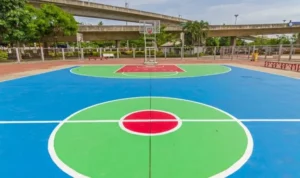A volleyball clinic is a focused training program that helps improve skills and techniques in the sport. It offers valuable coaching and practice opportunities for players to enhance their game.
Now, more than ever, volleyball clinics have become popular as players seek professional guidance to enhance their skills and take their game to the next level. These clinics are typically organized by experienced coaches or professional players, providing participants with expert knowledge and tailored training sessions.
From beginners learning the basics to advanced players refining their abilities, volleyball clinics offer a structured environment for skill development, teamwork, and overall growth in the game. Participants can expect a combination of drills, exercises, and game simulations to enhance their abilities, strategy, and understanding of the sport.
Table of Contents
ToggleWhat Is A Volleyball Clinic?
A volleyball clinic is a specialized training program designed to enhance players’ skills and knowledge in the sport of volleyball. It provides an opportunity for athletes of all levels to receive personalized coaching, practice specific techniques, and engage in game-like situations. When attending a volleyball clinic, participants can expect to learn from experienced coaches, interact with other players, and gain valuable insights to improve their abilities on the court.
Definition And Purpose Of A Volleyball Clinic
In simpler terms, a volleyball clinic is a focused training session that aims to develop and refine players’ volleyball skills and abilities in a structured and supportive environment. The primary purpose is to provide targeted instruction, guidance, and practice opportunities to help players become more proficient in various aspects of the game.
At a volleyball clinic, athletes can expect:
- Expert Coaching: Experienced coaches with in-depth knowledge of the game will lead the clinic, providing valuable insights and guidance throughout the training sessions.
- Specialized Training: Clinics typically have specific themes or areas of focus, such as serving, blocking, setting, or defense. This allows players to target their weak areas and dedicate concentrated effort towards improvement.
- Individual Attention: Unlike regular training sessions, clinics often have a lower coach-to-player ratio, ensuring each participant receives personalized attention and feedback.
- Innovative Techniques: Coaches may introduce new training methods, strategies, or drills to challenge players and help them discover different approaches to the game.
- Game-like Simulations: Clinics frequently incorporate game-like scenarios and simulated match situations, allowing participants to practice what they have learned in a realistic setting.
How Volleyball Clinics Differ From Regular Training Sessions
While regular training sessions focus on general skill development and team practices, volleyball clinics offer a more concentrated and specialized training experience. Here are some key differences:
| Regular Training Sessions | Volleyball Clinics |
|---|---|
| Typically conducted with a larger group of players | Often have a lower coach-to-player ratio, allowing for more individual attention |
| Emphasize team strategies and overall team performance | Focus on specific skills or areas of the game, tailored to individual improvement |
| May include conditioning exercises and general drills | Incorporate specialized training techniques and focused drills |
| Players of various skill levels may participate together | Some clinics may have specific skill level requirements, ensuring players receive appropriate instruction |
Overall, volleyball clinics supplement regular training sessions by providing a more specialized and intensive training experience. They offer the opportunity for players to receive focused instruction, improve specific skills, and gain valuable insights from knowledgeable coaches.

Credit: usavolleyball.org
Benefits Of Participating In Volleyball Clinics
Participating in volleyball clinics can have numerous benefits for players of all skill levels. Whether you are a beginner or an advanced player, attending a volleyball clinic can help you improve your skills, gain valuable knowledge from experienced coaches, build teamwork and communication skills, as well as enhance your physical fitness and stamina. Let’s explore these benefits in detail:
Improving Fundamental Skills And Techniques
Attending a volleyball clinic allows players to focus on improving their fundamental skills and techniques. Coaches at these clinics conduct specialized drills and provide valuable feedback to help players refine their techniques. Properly learning and mastering the basic skills, such as serving, passing, setting, hitting, and blocking, can significantly elevate a player’s overall performance on the court. By consistently putting effort into honing these skills at the clinic, players can set a strong foundation for their volleyball journey.
Gaining Knowledge From Experienced Coaches
One of the key benefits of volleyball clinics is the opportunity to learn from experienced coaches. These clinics are often led by coaches who have extensive knowledge and expertise in the sport. They provide valuable insights into different strategies, tactics, and game plans. With their guidance, players can gain a deeper understanding of the game, improve their decision-making abilities, and learn effective techniques to outmaneuver opponents. The knowledge imparted by experienced coaches in a clinic sets players on the path to becoming well-rounded and intelligent volleyball players.
Building Teamwork And Communication Skills
Volleyball is a team sport that heavily relies on effective teamwork and communication. Participating in volleyball clinics offers players the opportunity to develop these crucial skills. Through various team-oriented exercises and drills, players learn to work together, coordinate their movements, and anticipate each other’s actions on the court. Additionally, clinics often encourage open communication between teammates, fostering trust and unity. Building these skills in a clinic setting helps players become better team players, enhancing their overall performance and the success of their team.
Enhancing Physical Fitness And Stamina
Volleyball requires players to be physically fit and possess excellent stamina. Volleyball clinics incorporate rigorous training sessions that target improving physical fitness levels specific to the sport. These sessions focus on strength, agility, endurance, and flexibility. By consistently participating in these training programs, players can improve their overall fitness, enhance their power and speed, and increase their stamina on the court. The physical benefits gained through volleyball clinics can greatly contribute to a player’s overall performance and longevity in the sport.
In conclusion, participating in volleyball clinics can have a transformative impact on a player’s skills, knowledge, teamwork, and physical fitness. These clinics provide a supportive and educational environment that helps players grow and excel in the sport. Whether you are a beginner looking to grasp the fundamentals or an experienced player aiming to take your game to the next level, attending a volleyball clinic offers a multitude of benefits that can enhance your overall volleyball journey.
Types Of Volleyball Clinics
When it comes to improving your volleyball skills, attending a volleyball clinic can be a game-changer. These clinics provide players of all ages and skill levels with the opportunity to receive expert coaching, practice essential techniques, and enhance their overall understanding of the game. Volleyball clinics are designed to focus on different aspects of the sport, catering to specific skill sets, positions, age groups, and experience levels. In this article, we will explore the different types of volleyball clinics and how they can benefit players in their quest to become better athletes.
Skill-specific Clinics (e.g., Serving, Setting, Spiking)
Skill-specific clinics are tailored to improve a particular aspect of a player’s game. These clinics focus on refining specific skills such as serving, setting, or spiking. By honing these essential techniques, players can elevate their performance on the court. Skill-specific clinics allow participants to receive specialized coaching directly related to their individual needs, providing targeted feedback and guidance to help them develop a strong foundation in that particular skill.
Position-specific Clinics (e.g., Libero, Middle Blocker, Setter)
Position-specific clinics are designed for players looking to excel in a particular volleyball position. Whether it’s libero, middle blocker, setter, or any other position, these clinics offer expert instruction and training specific to the demands of that role. Participants learn position-specific strategies, footwork, and technical skills necessary to succeed in their chosen position. These clinics provide an opportunity to gain a deeper understanding of the responsibilities and nuances associated with playing a position, ultimately enhancing a player’s overall performance on the court.
Age-specific Clinics (e.g., Youth, High School, College)
Age-specific clinics cater to players of different age groups, ensuring that the coaching and training provided are appropriate for their developmental stage. From youth clinics to high school and college-level clinics, participants receive instruction and guidance that aligns with their current skill level and age-specific needs. These clinics foster an environment where players can learn and grow alongside their peers, allowing for healthy competition and camaraderie among participants.
Advanced-level Clinics For Experienced Players
Advanced-level clinics are designed for experienced players who are already proficient in the fundamentals of volleyball and seeking to take their skills to the next level. These clinics offer intensive training focusing on advanced techniques, complex strategies, and game-specific scenarios. Designed for those with a solid foundation in the sport, advanced-level clinics provide a challenging environment where players can refine their skills and develop a deeper understanding of the game, allowing them to excel at a higher level of competition.
Preparing For A Volleyball Clinic
Choosing The Right Clinic For Your Skill Level And Goals
Before diving into a volleyball clinic, it’s important to choose one that aligns with your skill level and goals. While some clinics cater to beginners, others are designed for intermediate or advanced players. To ensure you get the most out of your experience, assess your current skill level and identify areas you want to improve. Then, look for a clinic that offers training specific to your needs.
Understanding The Clinic Schedule And Requirements
Each volleyball clinic has its own schedule and requirements. Familiarize yourself with these details to be fully prepared. The clinic schedule will outline the duration of the program, including the number of days and hours of training. It may also include additional activities such as team-building exercises or skill-specific workshops. Take note of any prerequisites or age restrictions to ensure you meet the requirements for participation.
Gathering The Necessary Equipment And Attire
Proper volleyball equipment and attire are essential for a successful clinic experience. Before attending, make a checklist of the items you’ll need. This typically includes volleyball-specific shoes, kneepads, comfortable athletic clothing, and a water bottle to stay hydrated during the training sessions. If you own a volleyball, it’s recommended to bring it along for personal practice or drills during breaks.
Additionally, some clinics may have specific equipment requirements. For example, if the clinic is held on a beach, you may need to bring outdoor volleyball shoes or beach socks to protect your feet from hot sand. It’s always a good idea to check with the clinic organizers about any specific equipment you should bring.
Participating In Volleyball Drills And Exercises
Participating in volleyball clinics involves engaging in various drills and exercises that focus on enhancing individual skills, teamwork, coordination, and overall performance on the court. These volleyball drills and exercises are designed to address specific aspects of the game, allowing players to improve their techniques, physical abilities, and understanding of the game as a whole.
Engaging In Warm-up Exercises And Stretches
Prior to delving into the specific volleyball drills and exercises, warm-up exercises and stretches are an essential part of any volleyball clinic. These warm-up activities help prepare the body for the physical demands of the sport and reduce the risk of injuries. Some common warm-up exercises include:
- Dynamic stretches, such as leg swings, arm circles, and lunges, to increase flexibility and range of motion.
- Cardiovascular exercises, such as jogging or jumping jacks, to increase heart rate and blood flow.
These warm-up exercises also serve as an opportunity for players to mentally prepare for the training session ahead, focusing their attention and mindset on the game.
Practicing Individual Skills Through Drills And Repetition
Volleyball clinics incorporate various drills and exercises that allow players to work on their individual skills. These drills focus on specific aspects of the game, such as serving, passing, setting, hitting, and blocking. Through repetition and practice, players refine their techniques, improve their accuracy and consistency, and build muscle memory.
Some of the individual skill drills include:
- Serving drills: Players practice different types of serves, such as float serves or jump serves, aiming for precise placement and power.
- Passing drills: Players work on their passing technique, developing the ability to receive a ball from different angles and deliver an accurate pass to the setter.
- Setting drills: Players practice setting the ball to the desired location, focusing on precision and consistency.
- Hitting drills: Players train their hitting technique, working on approaches, timing, and different types of attacks.
- Blocking drills: Players learn how to read the opponent’s hitting trajectory and position themselves effectively to block the attack.
By engaging in these drills and focusing on their individual skills, players strengthen their foundation and become more well-rounded volleyball athletes.
Taking Part In Team Drills To Improve Coordination And Teamwork
Volleyball is a team sport that requires communication, collaboration, and coordination among players. Volleyball clinics include team-focused drills and exercises to improve teamwork and enhance overall performance during actual matches.
Team drills often involve:
- Rotation drills: Players practice their movement and positioning on the court, ensuring seamless transitions and efficient rotations.
- Transition drills: Players learn how to smoothly transition from defense to offense and vice versa, maintaining a fast-paced game.
- Game simulation drills: These drills mimic game-like situations, allowing players to apply their skills and strategies in a realistic setting.
By actively participating in team drills, players develop a better understanding of their teammates’ strengths and weaknesses, leading to improved coordination and stronger teamwork. These drills foster effective communication, trust, and unity on the court.
Learning Volleyball Strategies And Tactics
Understanding Offensive And Defensive Strategies
One of the key aspects of a volleyball clinic is learning the various offensive and defensive strategies that can be employed during the game. These strategies play a crucial role in determining the outcome of a match and require a deep understanding of the game.
- Offensive strategies involve developing techniques to outmaneuver the opposing team’s blockers and create scoring opportunities. This may include coordinated attacks, quick sets, and smart placement of the ball to exploit gaps in the opponent’s defense.
- Defensive strategies, on the other hand, focus on preventing the opposing team from scoring. This may involve effective blocking, accurate digs, and well-coordinated movements to counter the opponent’s attacks. By understanding offensive and defensive strategies, players can anticipate their opponent’s moves and strategically position themselves to gain an advantage.
Analyzing Opponent’s Patterns And Adjusting Gameplay
Another important aspect covered in a volleyball clinic is the art of analyzing an opponent’s patterns and adjusting gameplay accordingly. This skill allows players to adapt their strategies and tactics based on the opponent’s strengths and weaknesses.
During a volleyball clinic, participants learn to analyze the opponent’s style of play, such as their preferred attack patterns, serving techniques, and defensive strategies. By studying these patterns, players can identify weaknesses that can be exploited and make necessary adjustments to their own gameplay.
By continuously monitoring and adapting to the opponent’s patterns, players can stay one step ahead and increase their chances of success on the court.
Implementing Effective Serving And Receiving Strategies
Effective serving and receiving strategies are vital for a successful volleyball game. These strategies are taught and practiced extensively during volleyball clinics to help players gain an edge over their opponents.
- Serving strategies focus on delivering powerful, accurate, and well-placed serves that disrupt the opponent’s passing system and make it difficult for them to organize an attack. It involves learning different types of serves such as float serve, jump serve, or topspin serve.
- Receiving strategies, on the other hand, involve mastering the art of passing and setting up the offense. A well-executed receive enables the setter to deliver the ball to the attacker, setting up a scoring opportunity. Players undergo training to improve their passing technique, footwork, and communication skills to ensure seamless receptions.
By implementing effective serving and receiving strategies, players can control the pace of the game, put pressure on the opponent, and create scoring opportunities for their team.
Mental Approach To Volleyball Clinics
A volleyball clinic is not just about physical skills and techniques; it also involves a significant mental aspect. Developing the right mental approach is essential for players looking to excel in their game. Volleyball clinics provide the perfect platform for players to enhance their mental abilities and achieve peak performance on the court.
Developing Focus, Concentration, And Mental Toughness
To succeed in volleyball, players need to have unwavering focus and concentration. Volleyball clinics focus on helping athletes develop these skills, allowing them to stay fully engaged in the game and perform at their best even in high-pressure situations. Through various drills and exercises, coaches provide players with the tools they need to train their minds to block out distractions and maintain concentration throughout the match.
Mental toughness is another critical aspect emphasized in volleyball clinics. It involves the ability to stay mentally strong and resilient, especially in challenging situations. Coaches work with players to develop strategies to overcome obstacles, stay positive, and maintain confidence in their abilities. By building mental toughness, players are better equipped to handle adversity and perform consistently at a high level.
Overcoming Performance Anxiety And Pressure
Performance anxiety and pressure can often hinder a player’s ability to perform to their full potential. Volleyball clinics address these challenges by providing a supportive and structured environment for athletes to learn effective coping mechanisms. Coaches educate players on techniques such as deep breathing exercises, visualization, and positive self-talk, which help alleviate anxiety and enhance performance.
Furthermore, volleyball clinics simulate game-like situations, gradually increasing the pressure on players. This exposure helps them become comfortable performing under pressure and deal with the expectations that come with competitive play. By overcoming performance anxiety and pressure, players are better equipped to excel in intense game situations.
Learning From Mistakes And Embracing Feedback
Mistakes are an inherent part of any sport, including volleyball. Volleyball clinics foster a nurturing environment where players can learn from their mistakes and grow. Coaches provide constructive feedback to help players identify areas for improvement and encourage them to take risks without fear of failure.
By embracing feedback, players gain valuable insights into their performance and understand how to make adjustments to enhance their skills. Volleyball clinics emphasize the importance of continuous learning and growth, encouraging players to view mistakes as stepping stones towards improvement.
Frequently Asked Questions For What Is A Volleyball Clinic?
What Are The Benefits Of Attending A Volleyball Clinic?
Attending a volleyball clinic provides an opportunity to learn new skills, improve technique, receive professional coaching, and meet other passionate players.
How Long Does A Typical Volleyball Clinic Last?
The duration of a volleyball clinic can vary, but on average, they usually last for a few hours or for a full day.
Who Should Attend A Volleyball Clinic?
Volleyball clinics are suitable for players of all skill levels, from beginners to advanced athletes, who want to enhance their game and gain valuable insights.
What Can I Expect To Learn At A Volleyball Clinic?
At a volleyball clinic, you can expect to learn various aspects of the game including serving, passing, setting, spiking, blocking, and positional tactics.
Can I Join A Volleyball Clinic If I Have Never Played Before?
Absolutely! Volleyball clinics often cater to participants of all experience levels, making them a great place for beginners to learn the fundamentals of the game.
How Do I Find And Register For A Volleyball Clinic Near Me?
You can find and register for volleyball clinics in your area by searching online, checking with local sports organizations, or asking your volleyball coach for recommendations.
Conclusion
To sum it up, a volleyball clinic is a valuable opportunity for players to enhance their skills and knowledge in the sport. Whether you’re a beginner looking to grasp the basics or an experienced player aiming to refine your technique, attending a clinic can provide the guidance and practice necessary for improvement.
By participating in drills, receiving expert coaching, and engaging with fellow enthusiasts, players can take their game to the next level. Don’t miss out on the chance to further develop your abilities and achieve success on the volleyball court.
You may also like to read this – How to Book the Best Volleyball Court?






